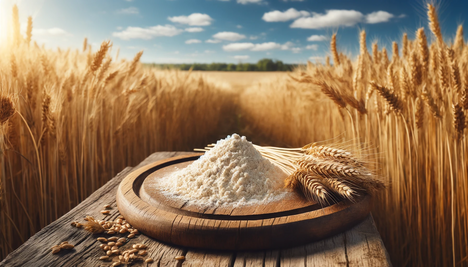Rye flour

Rye flour, a traditional ingredient in the human diet, especially in Europe, is known for its nutty flavor and multiple health benefits. While it is a popular food in our kitchens, the question arises as to whether rye flour is also suitable for dogs. This article examines the properties of rye flour and assesses the extent to which it can be an asset or a risk to our four-legged friends' diet.
What is rye flour?
Rye flour is milled from the grain of rye and is available in various degrees of fineness, which determine the proportion of grain components (germ, husk and endosperm) in the flour. It is rich in fiber, minerals and B vitamins and offers a healthy alternative to conventional wheat flour.
Benefits of rye flour for dogs
Rich in fiber
Rye flour has a high fiber content, which can promote healthy digestion. Fiber helps to increase the volume of stool and facilitate its passage through the intestines, which can help prevent digestive problems such as constipation in dogs.
Rich in nutrients
Compared to wheat flour, rye flour contains more vitamins and minerals, including B vitamins, iron, magnesium and zinc. These nutrients are important for a variety of bodily functions in dogs, including supporting the immune system and blood health.
Potential antioxidants
Rye contains antioxidants such as polyphenols and selenium, which can help fight cell damage caused by free radicals. Antioxidants are important for a dog's overall health and well-being.
Disadvantages and risks of rye flour for dogs
Contains gluten
Rye flour contains gluten, which can cause allergies or intolerances in some dogs. Symptoms of gluten intolerance can include skin problems, digestive disorders and a lack of nutrient absorption.
High carbohydrate content
Like other cereals, rye is high in carbohydrates which, if consumed in excess, can lead to weight gain and associated health problems, especially in dogs that are prone to obesity.
Potentially harmful substances
Rye, like other grains, can be contaminated with mycotoxins, secondary metabolites of molds that can be harmful to a dog's health. Proper storage and processing of the flour are crucial to minimize this risk.
Should you feed your dog rye flour?
The decision to include rye flour in your dog's diet should be carefully considered. For dogs without gluten intolerance and used in moderation, rye flour can be a nutritious supplement. However, it is advisable to feed rye flour only in small amounts and to carefully monitor your dog's reaction.
Tips for using rye flour
- Start with small amounts to test tolerance.
- Observe your dog for signs of allergy or intolerance.
Rye flour, used in moderation and carefully selected, can be a healthy addition to certain dogs' diets. It offers a number of benefits, including promoting digestive health and providing important nutrients. However, caution is advised due to the gluten content and risk of gluten intolerance and potential contaminant contamination.
If you notice any signs of hypersensitivity or poisoning in your dog, you should see your vet immediately. We are not a substitute for a vet, but we try to be as accurate as possible. Every dog reacts differently and we recommend you get a second opinion or consult your vet if in doubt.
Stay healthy and take good care of your four-legged friend!😊